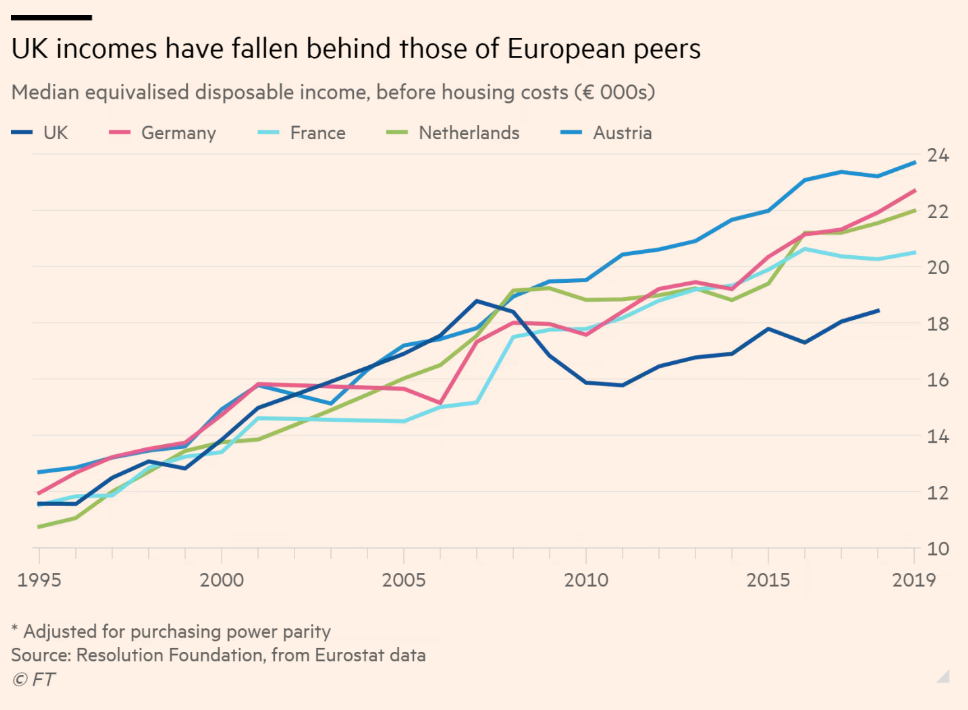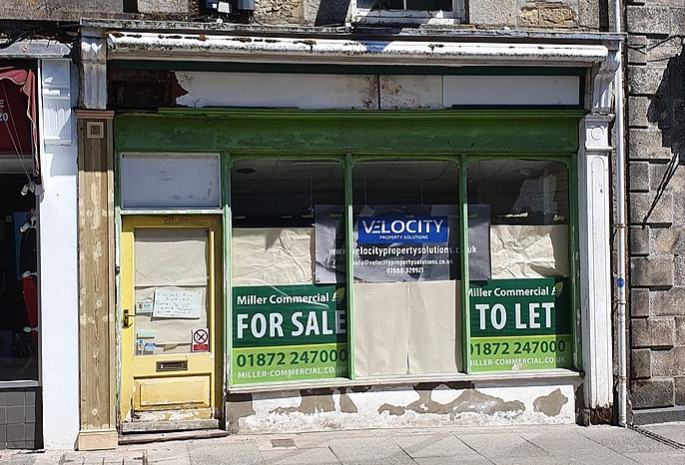By John Pickard
Writing in the Financial Times, its chief economic columnist, Martin Wolf, gave a stark description of the parlous state of British capitalism. Quite apart from Boris Johnson’s single most important legacy, Brexit – which by itself is having a debilitating effect on the economy – the new Tory Prime Minister will have to deal with the long-term economic decline in productivity and real incomes in the UK.
One of Boris Johnson’s most egregious lies – among so many – was the suggestions that he was aiming for a ‘high wage, high skill’ economy. In fact, the strategy of the British capitalist class for decades has been the very opposite of that. Compared to the other main countries of capitalism, Britain has a low rate of investment, a minimal level of spending on research and development, a workforce with declining skills, lower wages, lower pensions, fewer holidays and poorer working conditions.
“Even the current cost of living crisis is so bad” Martin Wolf writes, “because of the dreadful longer-term performance”.
For socialists, this economic backdrop is profoundly important, because it will impose an unavoidable imperative on any government, be it Tory or Labour. The new incoming Tory leader might promise tax cuts – and almost certainly offer them if there was a general election in the offing – but whatever is given with one hand will be taken away, and more, with the other.
It is worth citing at length what Martin Wolf writes: “As the Resolution Foundation notes in its latest Living Standards Audit, the 15 years between 2004 and 2019 — pre-Covid and pre-Brexit — were the weakest for growth in gross domestic product per head since the years between 1919 and 1934. Low growth in GDP per head caused low growth in household real disposable incomes: those for non-pensioners rose by 12 per cent between 2004-05 and 2019-20. This can be compared to an average rise of 40 per cent every 15 years since 1961”.
UK the most unequal society after the USA
Rather than raise productivity and increase wealth for all – the so-called ‘trickle-down’ policy – the custodians of British capitalism have squeezed out greater profits by limiting living standards and shifting the balance of wealth and income towards the rich and super-rich. As Wolf points out, “Between 1980 and 1995, median non-pensioner household real disposable incomes rose by 37 per cent, but by 67 per cent for the top decile and only 3 per cent for the bottom one”.
“Between 1992 and 2007, incomes rose by 41 per cent, 47 per cent and 37 per cent, respectively [ie median, top decile and bottom decile]…then, between 2004 and 2019, as median incomes rose by a mere 12 per cent, the top decile’s rose 11 per cent and the bottom’s 2 per cent: that was stagnation all round. In 2018, the distribution of disposable incomes was the most unequal in high-income democracies, after just the US”.

Compared, for example, to the German economy, which has a much higher level of investment, the UK economy has stagnated. Germany spends a far smaller proportion of its national income in arms expenditure, and it shows. “UK output per hour fell from 84 per cent of German levels in 2007 to 81 per cent in 2015 and 79 per cent in 2021. The UK’s relative GDP per head has also fallen, from 92 per cent of German levels in 2007, to 87 per cent in 2015 and 82 per cent in 2021”.
“Let them eat Brexit” is not a realistic policy
In the long run, the economic well-being of the big majority of the population, their real disposable incomes as well as the investments in Education, Health and other services on which workers rely, will all depend on the level of productivity of the economy. “Let them eat Brexit” is not a realistic policy for British capitalism and the exigencies of the economic system will force the Tories to further cut into living standards and services.
It is not just that the Tories are ‘bad people’ although they are. It is not that they are ‘incompetent’ in running the economy. It is that the economic imperative of a declining system will dictate policy to the government. It is the logic of the system that dictates a squeeze on living standards. That is something the right wing of the Labour Party do not understand or do not admit. In office themselves, they would be faced with the same pressure and the same logic of an economic system rigged in the interests of the rich and super-rich.
Given the fact that so many workers are, with justification, fighting back and attempting to win pay awards that keep them abreast of price increases, what is in store in the coming months and years is a huge clash of class interests, sharper and more intense than at any time for decades.
As the trade union leaderships take up the reins of these struggles – some (but not all) reluctantly and pushed by their members – there will be pressure too on the Labour leadership to support them. The instinct of most Labour members is to support workers who, after all, are only fighting to maintain their living standards. But the instinct of the right of the party is always to oppose any workers in struggle.
In microcosm, this difference presages big battles to come in the Labour Party in the future, between those who reflect the pressure, the needs and aspirations of the working class, and those who reflect the interests of capitalism. The British capitalism system, the so-called ‘market economy’, is beyond repair and incapable of ‘better management’. The fight of Labour members has to be to ditch the system altogether and to establish a system of economic governance that is democratic, socially-owned and planned for everyone’s benefit.



